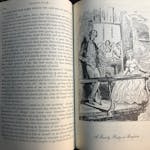In "Homeland Elegies," the character Ayad Akhtar — based almost exactly on the life of the novel's author, also named Ayad Akhtar — recounts how a blown gasket in his Saab 900 led to his writing a Pulitzer Prize-winning play. (The real Akhtar won a Pulitzer Prize in 2013 for his play "Disgraced," after a similar incident.)
Stuck on the side of the road in Scranton, Pa., Akhtar interacts with a suspicious state trooper and a deceitful auto mechanic, events that braid themselves into a scintillating story about the forces that shape and distort what it means to be a Muslim American in a post-Sept. 11 world.
Akhtar is an intrepid narrator. At the heart of this evocative book lies his fraught relationship with his Trump-loving, debt-ridden Pakistani immigrant father, Sikander, who serves as the reality star's physician in the years before his candidacy. Sikander's fidelity to Trump persists despite his insults targeting minorities and his proposal of a Muslim database. This stalwart loyalty leaves Akhtar aghast and frustrated.
"My father supported Trump's election, and he supported him well past the point that any rational nonwhite American (let alone sometime immigrant!) could possibly have justified to himself or anyone else."
Meanwhile, Sikander's foil, Akhtar's skeptical mother, Fatima, is haunted by the violence she witnessed during the Partition of the subcontinent. She rejects her husband's infatuation with U.S. supremacy and pines for Pakistan.
In a novel that blurs fact and fiction, Akhtar meditates on what is real, what is imaginary, and what has been hiding in plain sight. Sikander, unbeknown to his son, has built a second life. Fatima's diary unearths a secret love for a man whose loyalty to Muslim rebels in the subcontinent and subsequent move to Peshawar result in dire consequences.
This tension between his father's unfettered patriotism and his mother's distrust of it, coupled with the spike in Islamophobia after the Sept. 11 attacks, takes a toll on Akhtar. He works through it with a disciplined writing practice, where he painstakingly describes the events of each day. He even tapes a No. 2 pencil to his finger while sleeping, so that he can transcribe his dreams immediately upon awakening.
The book's stream of consciousness, absorbing prose and, at times, frenetic pace reflect this rigorous writing routine. Each scene embodies a sharp rendering of minutiae. Some paragraphs stretch to pages in length. It's as if Akhtar worries that the details might evaporate from his mind if he doesn't memorialize them on paper quickly enough. With this style, he succeeds in seamlessly weaving together threads about bigotry, nationalism and grief.
Despite his keen observations about the world and the darkness that inhabits it, Akhtar, relying on the New York Times' election needle, is stunned by the outcome of the 2016 presidential election. "The writer in me knew that stories are made of movement, not morality; demand conclusion, not consonance; and often conjure into being the very terrors they are written to wish away."
"Homeland Elegies," in this sense, is Akhtar's rapturous reckoning with this terror.
Anjali Enjeti's reviews have appeared in the Atlanta Journal-Constitution, Washington Post and elsewhere.
Homeland Elegies
By: Ayad Akhtar.
Publisher: Little, Brown, 368 pages, $28.
Event: Twin Cities Book Festival, Oct. 15-17. www.twincitiesbookfestival.org





